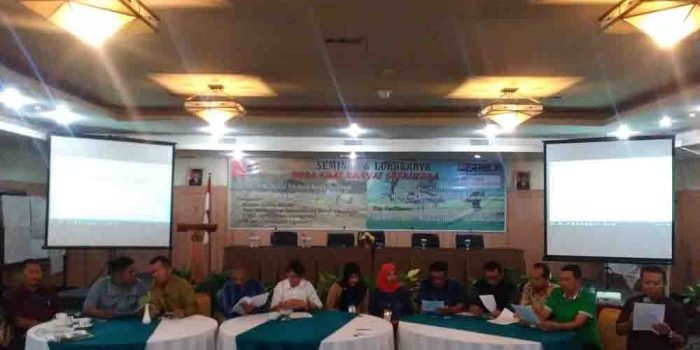
Gemawan held a seminar and workshop with the theme Strong Villages, Prosperous Communities at Mahkota Hotel, Pontianak City, Wednesday-Friday (29-31 / 03/2017) with guest speakers from the Ministry of Villages and Development of Disadvantaged Regions, Department of Community and Village Empowerment of West Kalimantan Province, Regent of North Kayong, Hildi Hamid, IRE Yogyakarta, DR. Abdur Rozaki and attended by various village representatives from 12 regencies/cities in West Kalimantan.
On the third day, Gemawan through its Management Board, Hermansyah, invited the media crew to deliver a reflection on the 3-year implementation of the Village Law in West Kalimantan. In his opinion, law number 06 of 2014 regarding villages is a highly advanced policy in an effort to manage the villages in Indonesia.
The villages which were previously the subordinates of the government above them, through the law ratified on January 15, 2014, placed as the front guard for public services to the communities.
Therefore, the main spirit of the Village Law is to give back the acknowledgement to the village diversity, village governance, citizen participation institutionalization, sharing the planning step and financial management.
With the right and authority handover to the Village, followed by certainty of budget policies through the Village Funds, it is expected that it can encourage the acceleration of equitable development to overcome poverty and underdevelopment in the villages.
“After three years of the implementation of the Village Law, the preconditions for village progress can at least be measured from two primary challenges. Firstly, how is the role of actors and institutions at the central, regional and village levels. Secondly, how is the capacity of the village government, how does the Village democratization work, as well as the emergence of a new economic scheme through BUMDesa.” he said, Friday (31/03/2017).
He mentioned, at the level of policy makers at the central level, there has been indeed a harmonization among the Ministry of Village, Development of Disadvantaged Regions and Transmigration, the Ministry of Home Affairs and the coordinating Ministry for Human Development and Cultural Affairs, yet there are still issues of consolidation, effectiveness and efficiency.
Meanwhile, at the regional level, there is a need for regional heads who are responsive and quick in policy making who will facilitate and supervise the village in order to be able to implement the village development paradigm.
According to him, at the village level, a new leadership style which is populist by involving citizen participation is needed.
On the other hand, there are still village governments with weak capacities because they do not have the facilities and infrastructure of Human Resource services, village officials are limited, as well as village heads who are oriented towards their own relatives.
“Village democratization should be able to run with active and empowered society, responsive and aspirational village governments, functioning BPD supervision, participatory and representative village meetings, as well as village policies which are oriented towards the welfare and care for vulnerable groups. Likewise, the new economic development scheme through BUMDes is expected to explore local economic potential, maintain and protect environmental resources as an asset and a source of sustainable livelihoods in the villages. “he said.
Hermansyah said that in West Kalimantan the development of the Village Law implementation in 3 years illustrates various dynamics. There are some which are quite advanced because the regency governments have been responsive in facilitating and fast-paced in establishing various derivative policies of the Village Law. However, most have not been able to move forward due to the less optimal role of the regency governments.
“The process of village democratization in an effort to eradicate poverty faces various challenges, including capacity building for village governments and BPD, expanding participation and communities who ensure policies that are oriented towards the welfare of the community, especially vulnerable groups.
Even in many villages, they are still struggling with fundamental problems, such as borders, management and financial reporting, public service facilities, the lack of community participation, access of information on derivative policies set by the regency governments, including transparency in budget formulations received by the villages.” he concluded.
Source: http://pontianak.tribunnews.com/2017/03/31/seminar-dan-lokakarya-gemawan-refleksi-tiga-tahun-implementasi-uu-desa-di-kalbar?page=2
